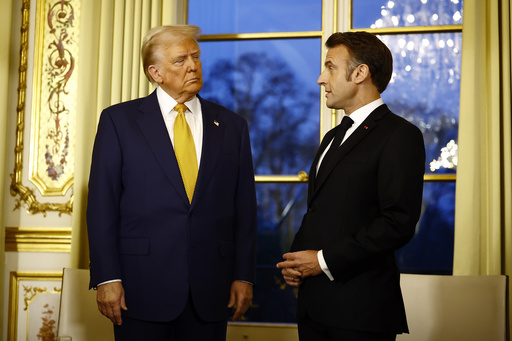“`html
At the United Nations, pressure has been applied by the United States on Ukraine to withdraw a European-supported resolution calling for the immediate exit of Russian forces from Ukrainian territory. This was revealed by a U.S. official and a European diplomat on Sunday. Instead, the U.S. has proposed an alternative resolution which does not explicitly mention the invasion by Russia.
Despite the U.S. pressure, Ukraine has chosen not to retract its draft resolution, resulting in the U.N. General Assembly planning to hold a vote on it this Monday, which coincides with the three-year anniversary of Russia’s invasion of Ukraine, according to two European diplomats.
The General Assembly is also anticipated to vote on the U.S. draft resolution afterward. This information comes from the same diplomats and the U.S. official, who preferred to remain anonymous due to the sensitive nature of ongoing discussions.
The Trump administration aims to put its proposal to a vote in the more influential U.N. Security Council as well. The 15-member council is scheduled to convene on Ukraine Monday afternoon, and a vote has been set for shortly thereafter. However, it has been suggested that Russia may request a postponement to Tuesday.
The competing resolutions illustrate the friction among the U.S., Ukraine, and European nations in the five weeks following President Donald Trump’s inauguration, during which the U.S. has begun dialogues with Russia after a period of estrangement in attempts to bring the conflict to a close. European leaders expressed concern about being excluded from earlier discussions between the U.S. and Russia.
Within the U.N. framework, the General Assembly has emerged as the central body concerning Ukraine as the Security Council remains immobilized due to Russia’s veto. Unlike the Security Council, the General Assembly does not have veto powers, making its votes a key measure of global sentiment. However, it is important to note that resolutions passed by the General Assembly are not legally binding.
Since Russian troops entered Ukraine on February 24, 2022, the General Assembly has passed a series of resolutions condemning the military actions and demanding a full withdrawal of Russian troops. Upcoming votes on the competing resolutions this Monday will be monitored closely as observers aim to gauge whether the global opposition to Russia’s actions remains strong, as well as to evaluate support for Trump’s initiative to seek a rapid resolution to the conflict.
According to one European diplomat, extensive lobbying has characterized the situation surrounding the competing resolutions. The U.S. official further reported that efforts are ongoing to coax Ukraine and European nations to abandon their draft. Concurrently, President Trump is set to host French President Emmanuel Macron in Washington that same day.
The United States maintains that now is a pivotal moment to push for an end to the conflict. Secretary of State Marco Rubio remarked in a recent statement that, despite potential challenges, the goal of sustainable peace is attainable. He believes that the resolution would underscore the tragic nature of the conflict and affirm the U.N.’s role in fostering peace.
The Ukrainian resolution, which has the support of the 27-nation European Union, specifically refers to “the full-scale invasion of Ukraine by the Russian Federation” and emphasizes the necessity of adhering to all prior assembly resolutions that respond to this aggression.
It clearly stipulates the General Assembly’s call for Russia to “immediately, completely and unconditionally withdraw all of its military forces from the territory of Ukraine within its internationally recognized borders” and to end all acts of aggression promptly. Additionally, it urges for “de-escalation, an early cessation of hostilities, and a peaceful settlement of the conflict.”
In contrast, the succinct U.S. draft resolution notes “the tragic loss of life throughout the Russia-Ukraine conflict” and calls for an expeditious conclusion to the discord while advocating for enduring peace between Ukraine and Russia without referencing the invasion itself.
Russia’s U.N. envoy, Vassily Nebenzia, previously described the U.S. resolution as “a good move.” Russia has also proposed an amendment to include the phrase “including by addressing its root causes,” thus modifying the final part of the U.S. resolution to reflect this addition.
“`


